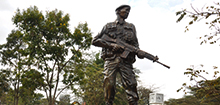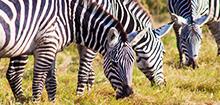AFRICAN NATIONS URGE EU, UK TO BAN ALL TRADE IN ELEPHANT IVORY
Follow China’s lead and shut down ivory trade, says African Elephant Coalition
The 29 member countries of the African Elephant Coalition (AEC) today praised China’s recent decision to ban its domestic ivory trade and called on the European Union and the UK to follow China’s lead next week and permanently ban all external and domestic ivory trade.
The AEC’s appeal follows China’s announcement on 30 December 2016 to end the processing and trade of ivory and ivory products by 31 March and to completely shut down ivory trade by the end of 2017, essentially closing the world’s largest market for poached ivory.
“We welcome China’s decisive action to close its ivory market,” said Patrick Omondi, Chairman of the AEC. “It’s a major breakthrough in the battle to save elephants. But we need other countries with legal domestic markets to follow suit and are calling on the EU to take advantage of the momentum created by China and shut down their trade in ivory once and for all.”
The European Commission is set to issue new guidance on ivory trade within and exports from the European Union over the next two weeks. A meeting of the EU CITES Management Authorities, which oversees trade in endangered species, is scheduled for 7 February, with a decision likely to be made soon after. On 6 February, the UK Parliament will debate a petition to close its domestic ivory markets – the petition has received more than 100,000 signatories.
The former president of Tanzania, H.E. Benjamin Mkapa, recently called on all nations to ban trade in elephant ivory. “We need to work together to stop this, our fellows must ban the importation and uses of elephant tusks, this means there will be no market for tusks and nobody will kill elephants,” said Mkapa at the “Walk for Elephants” event in Dar-es-Salaam on 14 January which was also attended by the Chinese ambassador to Tanzania, Dr. Lv Youqing. Tanzania’s elephant population, among the largest on the continent, has been hard hit by poaching.
“We strongly endorse the comments earlier this month by President Benjamin Mkapa,” said Andrew Seguya, Executive Director of the Uganda Willdlife Authority “We want to work together to close the market for ivory if we are to stop the killing of elephants.”
The African Elephant Coalition, whose member countries represent 70 percent of African elephant range States, led efforts to reverse the poaching crisis facing African elephants at the 17th Conference of the Parties (CoP17) of the Convention on International Trade in Endangered Species of Wild Fauna and Flora (CITES) in Johannesburg, South Africa last September and October. Its package of five proposals at CoP17 included closing domestic ivory markets around the world, and banning international trade in ivory by listing all elephants in CITES Appendix I, the highest level of protection under international law. Delegates from 158 countries attended CoP17.
After intense debate, CITES agreed on a recommendation “that all Parties and non-Parties in whose jurisdiction there is a legal domestic market for ivory that is contributing to poaching or illegal trade, take all necessary legislative, regulatory and enforcement measures to close their domestic markets for commercial trade in raw and worked ivory as a matter of urgency.” (See Resolution Conf. 10.10 (Rev. CoP17), Trade in Elephant Specimens, page 3, paragraph 3.)
The AEC proposal for a permanent ban on international trade in elephant ivory failed to gain a necessary two-thirds majority but was strongly supported by Botswana, one of the four countries – along with Namibia, South Africa and Zimbabwe – whose elephant populations are currently in Appendix II, a less endangered status. Botswana has the largest population of elephants in the world and, along with other African countries, has been seriously impacted by the poaching crisis, with a loss of 15 percent since 2010 according to the Great Elephant Census published in August 2016.
The European Union represented by the European Commission and participating as a full Party with 28 EU Member States in one voting bloc, voted against the AEC up-listing proposal. Only France amongst major EU states supported strong measures to protect elephants. Sources indicate the UK fully supported the EU position contradicting public assurances on stopping the ivory trade.
“The CITES recommendation to close domestic ivory markets was a breakthrough. But it will be meaningless if countries ignore it. The EU and its Member States have an opportunity to realign themselves with France, which recently issued strict regulations, and work with China to implement the CITES recommendation,” said Patrick Omondi. “One thing is certain: business as usual is not an option if we want to save elephants for future generations.”
# # #
About the African Elephant Coalition
The 29 member countries of the African Elephant Coalition include: Benin, Burkina Faso, Burundi, Cameroon, Central African Republic, Chad, Comoros, Democratic Republic of the Congo, Republic of the Congo, Equatorial Guinea, Eritrea, Ethiopia, Gabon, Ghana, Guinea, Guinea-Bissau, Ivory Coast, Kenya, Liberia, Mali, Mauritania, Niger, Nigeria, Rwanda, Senegal, Sierra Leone, South Sudan, Togo and Uganda.
EU Ivory Trade: The Need for Stricter Measures
In a briefing submitted to the European Commission earlier this month, some 30 wildlife conservation organizations recommend that the Commission immediately draw up strict guidance advising EU members states not to issue permits for the export of any raw or worked ivory items, and to follow that with a mandatory, comprehensive and permanent ban on all external commercial trade in ivory, a prohibition on commercial ivory trade within the EU, and meaningful enforcement of the strengthened controls. They highlight that:
- 20,000-30,000 elephants are killed annually for their ivory. Continued demand and trade in ivory from any source, legal or illegal, including worked ivory and pre-convention specimens, negatively impacts elephant populations.
- The EU is the largest global exporter of legal ivory into international markets. There was a dramatic rise in raw and worked ivory re-exports from the EU in 2014 and 2015. The largest customer for EU ivory is China, which alongside other Asian destinations is driving the elephant poaching crisis.
- The EU is an increasingly important transit route for illegal ivory, as shown by record large-scale seizures in 2016, which are an indicator for organized crime.
- There is evidence of constant attempts to evade the current EU rules on ivory trade, which are complex and full of loopholes and lack adequate enforcement or inspection measures.
CONTACTS
- Patricia Awori, AEC Secretariat: +254 722 510 848 / aworipat@africanelephantcoalition.org
- Don Lehr, Media Relations Consultant: +1 917 304 4058 / dblehr@cs.com





